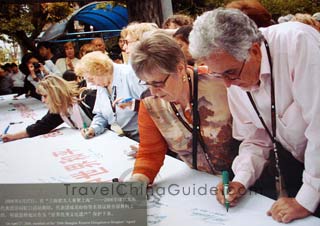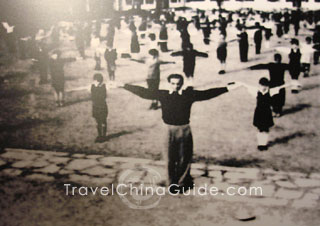Code: JT03
Jewish Culture Discovery in Kaifeng

Signature for Jewish heritage protection
According to historical data, there were a Jewish community and a synagogue in Kaifeng, which existed from the twelfth century at the least to the late nineteenth century. But still some scholars deem that Jewish people lived in Kaifeng in the early ninth century. Supposedly, the ancestors of Kaifeng Jews came from Persia and Khazar in Middle East or India. In a country with the predominance of Confucianism, it's very uncommon to see such a group existed in China for about 700 years.
As an ancient capital of seven dynasties, Kaifeng City makes a completely stable and safe impression on tourists. It keeps a steady pace of life like many other inland Chinese cities. To see the Jewish heritage, you're suggested to go to visit the Kaifeng Museum first. On the fourth floor, there is an exhibition hall of Jewish culture and history. After that, you may just go out of the museum, round the Lord Bao Temple and Lord Bao Lake and then cross the Ziyou Road and the Drum Tower Square. Continue walking northwards for about one kilometer, and you can reach the most famous concentration place of Kaifeng Jews in the history. It's the Jingjiao Hutong (Sect Alley).
As an ancient capital of seven dynasties, Kaifeng City makes a completely stable and safe impression on tourists. It keeps a steady pace of life like many other inland Chinese cities. To see the Jewish heritage, you're suggested to go to visit the Kaifeng Museum first. On the fourth floor, there is an exhibition hall of Jewish culture and history. After that, you may just go out of the museum, round the Lord Bao Temple and Lord Bao Lake and then cross the Ziyou Road and the Drum Tower Square. Continue walking northwards for about one kilometer, and you can reach the most famous concentration place of Kaifeng Jews in the history. It's the Jingjiao Hutong (Sect Alley).
The bystreet Jingjiao Hutong was called Tiaojin Hutong in the early times. Here Tiaojin means 'get rid of beef or lamb tendons'. In the light of Jewish customs, Jews don't eat beef or lamb tendons in order to commemorate their ancestor Jacob, who strained his thigh when wrestling with the god. So, the folks there nicknamed the alley Tiaojin Hutong. Later, the General Feng Yuxiang thought this name was not so nice. Then, he changed it to the current name, Jingjiao Hutong.

The Jewish students doing exercise at school
In history, many Jews lived in this alley. When some Jews came to China during the Northern Song Dynasty (960-1127), they sent occidental cloth to the emperor of the Northern Song. The emperor felt very happy. He said as long as the Jews would like to pledge allegiance to China and stand by Chinese customs, they can live in Bianliang. Bianliang, actually, is the ancient name of Kaifeng. Chinese people didn't look down upon the Jews. Very naturally, the Jews started to join the imperial examinations like many other Han people and many of them became officials.
Today there are eight Jewish families in Kaifeng with the Han people's surnames of Zhao, Ai, Li, Zhang, Shi, Jin and Gao. Each surname has its own origin. For example, Ai came from Adam. Zhao was given by the emperor of Song (The emperors of Song were surnamed Zhao.)
Today there are eight Jewish families in Kaifeng with the Han people's surnames of Zhao, Ai, Li, Zhang, Shi, Jin and Gao. Each surname has its own origin. For example, Ai came from Adam. Zhao was given by the emperor of Song (The emperors of Song were surnamed Zhao.)
Through more than 1000 years' assimilation, the descendants of Jews in Kaifeng look quite similar to the Han people. However, some Jewish families still keep their unique customs, such as 'never eat pork', 'never eat the tendons of animals' and 'keep the Sabbath'. In the 1980s, some descendants of Jews in Kaifeng accepted the DNA test. The test result suggests the bloodline of the Jews in Kaifeng originated from the Jewish people who lived by the Tigris and Euphrates. Moreover, their bloodline is very similar to the Armenian and Arabian Jews.